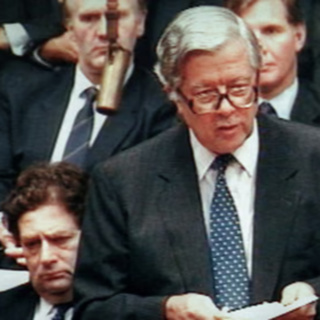
67. A new era
After a period of serious instability, the fifth government in a period of a mere two years secured itself a position in which it would last for the best part of two decades. The process was a particularly curious one, since it involved what has been referred to as a coup d’état by the king against his own government. That succeeded only thanks for the clever work of the monarch, and above all of the man who would become Britain’s youngest Prime Minister ever. Illustration: ‘Aside he turn’d for envy, yet with jealous leer malign, eyd them askance’, by James Gillray. National Portrait Gallery D12302. Fox on the right glaring at Pitt, second from left. Music: Bach Partita #2c by J Bu licensed under an Attribution-NonCommercial-No Derivatives (aka Music Sharing) 3.0 International License
3 Des 202114min

66. Crisis in Britain
While there’s much talk about the huge gains made by the American colonists, and the triumphant launching of the United States of America, far less is generally said about the effect of the American war in the mother country itself. Since Britain was also fighting France, Spain and Holland, the impact on its economy was massive, and on the political establishment if anything even more massive. Loyalty swung wildly, old allies became new adversaries, or vice versa, administrations were formed and fell in rapid succession. All this happened while in the background the latest battle was being fought between king and parliament over who would have the greatest authority over government. Illustration: Soldiers deployed during the Gordon Riots, by John Seymour Lucas, in a painting of 1879. Public Domain Music: Bach Partita #2c by J Bu licensed under an Attribution-NonCommercial-No Derivatives (aka Music Sharing) 3.0 International License
29 Nov 202114min

65. Another Revolution
With the fall of Lord North’s government, king George III found himself obliged to submit to the authority of parliament and appoint a government led by the Marquess of Rockingham, a man he deeply disliked and distrusted. His resentment was all the deeper because Rockingham, almost certainly at the urging of his secretary the remarkable Edmund Burke, laid down conditions for the formation of the government, and in particular the staggering words, “The king must not give a veto to the Independence of America.” A subject telling the king what he must not do? That was a small revolution. Rockingham’s was the first of three short-lived governments whose most important achievement was the granting of US independence, the end of the war in America, and the end of the wider, world war to which it had led. Illustration: The Treaty of Paris, by Benjamin West, 1783. The painting is unfinished because the British delegation to the treaty negotiations refused to pose for it. Music: Bach Partita #2c by J Bu licensed under an Attribution-NonCommercial-No Derivatives (aka Music Sharing) 3.0 International License
19 Nov 202114min

64. North's last laugh
We’ve seen how the British war in North America led to yet another world war, and how that war then reacted back on the American fighting by, in effect, making the victory of the rebel colonists ultimately all but certain. In this episode, we think about what the impact of all that was on life in Britain itself. There, it played a huge role in the never-ending battle between royal and parliamentary power. The king, George III, was fighting to hang on to his still considerable prerogative, in particular to appoint ministers, including the leading figure in a government, increasingly though still not officially called the Prime Minister. Against the king and his loyal government, led by Lord North, many in the Whig Opposition wanted to see power move still further towards the parliamentary side. With the war not going particularly well, and indeed going exceptionally badly in North America, North found his position increasingly embattled. And the Opposition moved in for the kill, to bring him down and to claw more authority from the king. Successfully in the end. Though North did have the last laugh. Which must have been fun, though perhaps not enough to make up for the failure of his administration… Illustration: Frederick North, 2nd Earl of Guildford (Lord North in his time as Prime Minister), by Nathaniel Dance, 1773-74. National Portrait Gallery 3627. Music: Bach Partita #2c by J Bu licensed under an Attribution-NonCommercial-No Derivatives (aka Music Sharing) 3.0 International License
13 Nov 202114min

63. Ingredients of Defeat
What led to the British defeat in North America? Was it a battle at Yorktown in Virginia, brilliantly won by George Washington and the Count of Rochambeau's American and French armies? And did that victory at Yorktown immediately lead to US independence? This episode sets out to give the context to Yorktown and reinterpret the common narrative about the Franco-American victory. Essential to a new understanding is to take into account that Britain was no longer fighting just a war in America, but another world war, after the Seven Years' War. This time, though, a decade and a half of ill-planned economy measures had left the country desperately badly prepared to fight it. That, more than any one battle, even as disastrous a defeat as Yorktown, made it inevitable that Britain would lose its American colonies. Illustration: The Battle of the Chesapeake (sometimes called the Battle of the Virginia Capes). Public domain. Music: Bach Partita #2c by J Bu licensed under an Attribution-NonCommercial-No Derivatives (aka Music Sharing) 3.0 International License
28 Okt 202114min

62. Divorce
The revolting Americans, by the time of this episode, have decided they’ve had it right up to here with the Brits. It’s time to part company. So they adopt a Declaration of Independence, basically serving divorce papers on the Mother Country. Which refuses to sign them, of course, ensuring that the ugly dispute lasts another few years. As for that dispute, it goes on with the advantage swinging from one side to the other. William Howe wins a couple of victories over the still inexperienced Washington, but fails to follow them up. Washington gets good at dodging destructive defeats and keeping the cause alive. But then, to everyone’s surprise, he even wins a couple of impressive victories. Then the Brits launch a cunning scheme to win a decisive victory, which goes colossally wrong, leading to their worst defeat of the war, at Saratoga. Meanwhile, back in England Pitt is still trying to persuade his countrymen to take a more sensible stance. “Conquering America is impossible,” he tells them, but they aren’t listening. Then, when a voice is raised in Parliament for the recognition of American Independence, he pretty much dies opposing it – it actually takes him nearly five weeks to die, but the attack from which he failed to recover hit him in the House of Lords, while he was struggling to speak out. A nasty divorce. With plenty of fighting. And a lot of bad blood on the way. Illustration: Portrait of George Washington by Gilbert Stuart, 1796. National Portrait Gallery 2001.13. Music: Bach Partita #2c by J Bu licensed under an Attribution-NonCommercial-No Derivatives (aka Music Sharing) 3.0 International License
22 Okt 202114min

61. None so deaf
Enjoy the words of two remarkable people in England who battled on for the cause of conciliation between the home country and the colonists in America. Neither was listened to. This was a time when many in Britain wanted only to turn a deaf ear to the Americans and their concerns. Meanwhile, back out there, General Gage was still in command of a military force occupying Boston. He decided it was time to use his military force militarily and sent troops to two Massachusetts villages that have since entered American legend. They are Lexington Green and Concord. While they were there, a hostile confrontation led to a shot being fired, and we were off: what had been a war of words became a shooting war. It started badly for the British. We’ll discover soon that it would end just as badly. But it would take some seven years. Illustration: Portrait of Edmund Burke from the studio of Joshua Reynolds, circa 1769. National Portrait Gallery 655. Music: Bach Partita #2c by J Bu licensed under an Attribution-NonCommercial-No Derivatives (aka Music Sharing) 3.0 International License
19 Okt 202114min

60. Things go south under Lord North
It’s time for that exciting moment in American (and British) history, the Boston Tea Party. But tea, as well as being a commodity deeply rooted in the British soul, is also a wonderful link between the two wings of Britain’s growing Empire, India and North America. In India, of course, power was still being exercised by the East India Company. That had disastrous results in the subcontinent, and a corrupting effect in Britain. But the government found itself powerless to do anything about it, while the Indian people, especially of Bengal, suffered tragically. As for North America, that was where the East India Company, then going through lean times, was hoping that exports would help it rebuild its fortunes. Tea was to be the product that would do the trick. But in fact, it only led to another grinding step downwards in relations between mother country and colonies, one that brought closer the approaching disaster (for Britain). Illustration: Boston Tea Party. Original uploader was Cornischong at lb.wikipedia - Source:W.D. Cooper. ‘Boston Tea Party’, The History of North America. London: E. Newberry, 1789.Engraving. Plate opposite p. 58. Rare Book and Special Collections Division, Library of Congress. Transferred from lb.wikipedia Music: Bach Partita #2c by J Bu licensed under an Attribution-NonCommercial-No Derivatives (aka Music Sharing) 3.0 International License
8 Okt 202114min





















